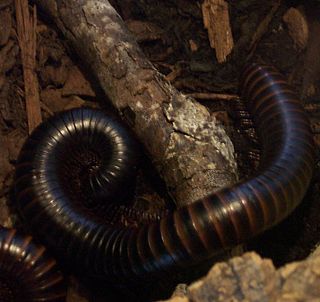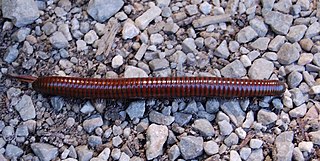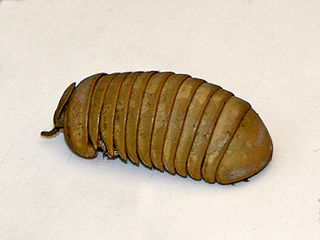
Lithobius is a large genus of centipedes in the family Lithobiidae, commonly called stone centipedes, common centipedes or brown centipedes.
Alloporus is a genus of giant millipedes that live in deserts. It contains the following species:
Anastreptus is a genus of giant African millipedes in family Spirostreptidae, containing four species:

Spirostreptus is a genus of giant millipedes of the family Spirostreptidae. It contains the following species:

Orthoporus is a genus of spirostreptid millipedes, containing around 80 species, distributed from the southern United States to Brazil and Argentina.
Mardonius is a genus of giant African millipedes in family Spirostreptidae, containing nine species:
Telodeinopus is a genus of giant African millipedes in family Spirostreptidae, containing the following species:

Pachyiulus is a genus of julid millipedes containing the following species:

Julus is a genus of millipedes in the family Julidae, containing the following species:
Pachymerium is a genus of centipedes in the family Geophilidae found mainly in the west Palearctic region and in south Africa. Centipedes in this genus feature an elongate head, scattered coxal pores, and sternal pores in a pair of anterior groups and a posterior transverse band; the forcipular coxosternite is broad, and the ultimate article of the forcipule has a prominent basal denticle.

Zephronia is a genus of giant pill millipedes in the family Zephroniidae. This genus includes 47 species distributed throughout N. India, Myanmar, Thailand, Malayan Peninsula, Java, Sumatra and Borneo.

Trachysphaera is a genus of dwarf pill millipedes in the order Glomerida. Just over 30 species are known, making it the third most species-rich genus of Glomerida. Trachysphaera species are patchily distributed throughout Europe and western Asia, extending from Spain to Caucasia. Members of this genus are tiny, with modified appearances resembling that of calcareous stones.

Geophilus is a large, heterogeneous genus of soil centipedes in the family Geophilidae largely considered to be synonymous with Brachygeophilus. This genus is mostly Holarctic and characterized by a claw-shaped ultimate pretarsus, complete or nearly complete coxo-pleural sutures at the prosternum, and incomplete chitin-lines. Centipedes in this genus feature slightly elongate heads and labral intermediate parts with tubercles, the forcipules are usually poorly elongate with a single small tubercle at the base of each tarsungulum, and the anterior trunk metasternites usually have an anterior medial socket and a posterior transversally elongate pore-field. The generic name first appeared in Brewster's Edinburgh Encyclopaedia in 1814 as Geophilus electricus.

Anoplodesmus is a genus of millipedes. It is one of the most species rich genera in the family Paradoxosomatidae, with over 40 described species distributed from India and Nepal to China and Southeast Asia, as well as the Mascarene Islands and Fiji.

Thyropygus is a genus of millipedes in the family Harpagophoridae, widely distributed throughout Southeast Asia. It is the most-species rich genus of Harpagophoridae in Southeast Asia. Over 30 species occur in Thailand.

Trigoniulus is a genus of millipede in the family Trigoniulidae. There are at least 90 described species in Trigoniulus.
Siphonophora is a genus of millipedes belonging to the family Siphonophoridae.

Cryptops sometimes known as cave centipedes, is a centipede genus in the family Cryptopidae; species records have a world-wide distribution.

Otostigmus is a genus of centipedes in the family Scolopendridae. It was first described by Swedish naturalist Carl Oscar von Porat in 1876. The genus as a whole comprises around 157 species, found primarily in the Neotropics.

Otostigminae is a large subfamily of centipedes, containing nearly half of all species in the family Scolopendridae. Members of this subfamily are abundant and widespread throughout the tropical and subtropical regions of the world, mostly in Africa, Asia, and Australia.














